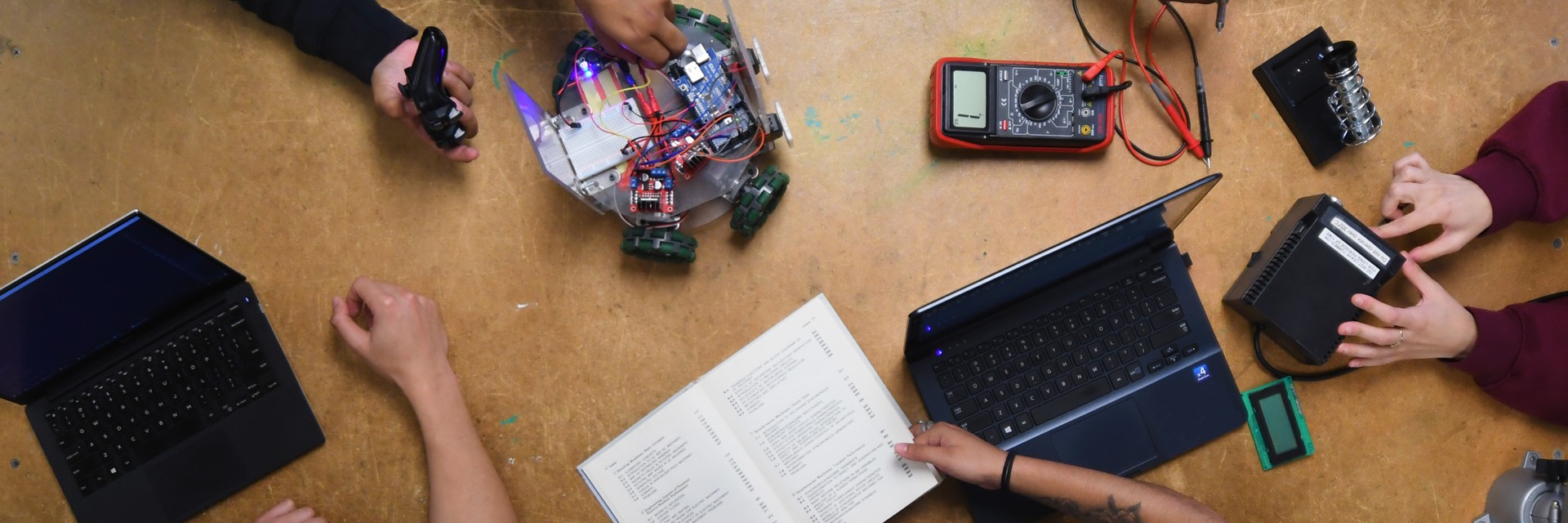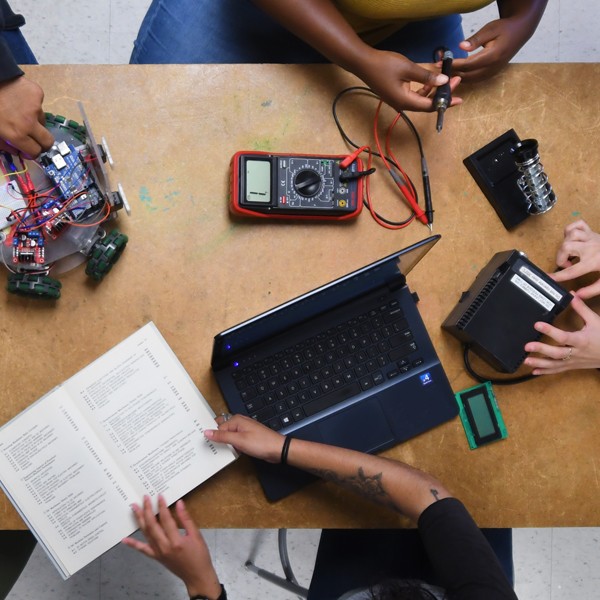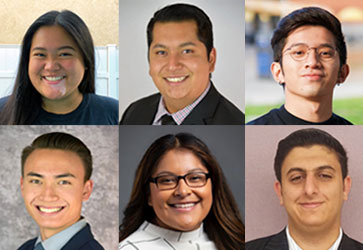ECST Students Made Remote Summer Internships Work
Top L to R: Adriana Aldana, Juan Avila, Ralph Christian Belleca, Aaron Lockett, Rosa Cortes Mejia, Levon Ghabuzyan
Faced with the challenge of making internships engaging and meaningful during a global pandemic, according to a May 2020 survey of employers by the National Association of Colleges and Employers, 22 percent of employers said they were revoking their offers to interns and cancelling their internship programs altogether. This was certainly disappointing news for thousands of college students across the country, including some of our own students.
However, the survey also found that the majority of employers planned to move forward with their internship programs, with modifications. These included shortening the length of internships, moving internships entirely to virtual spaces, or adopting a hybrid model, with interns mostly clocking in online but occasionally coming into the office or attending in-person events with appropriate precautions such as social distancing and wearing faces masks.
The experiences of six ECST students interns this summer reveal both the challenges and rewards of remote (mostly) internships. All six students had received summer internship offers earlier in the academic year, but most didn’t find out until May or even early June that their internships would go ahead. All but one had at least one previous internship experience, with two students having had more than one or a year-round internship with the same company.
For some interns, the jobs they’d been offered for the summer had to change because certain types of work can’t be done online. One intern’s job changed for the opposite reason: the engineers who were going to supervise his work were mandated to work from home while he was asked to come into the company’s offices. Another intern was asked to travel out of state for her internship and was provided with housing for the summer—but ended up working remotely from her company-sponsored apartment.
These are the six ECST students who were interviewed about their internships:
Adriana Aldana, third-year Mechanical Engineering student, Engineering Intern at Raytheon, El Segundo, California
Juan Avila, fourth-year Electrical Engineering student, Electronics and Communications Subsystems Design Intern at Boeing, El Segundo, California
Ralph Christian Belleca, third-year Computer Science student, Marketing Digital Sales Intern, Farmers Insurance, Los Angeles
Levon Ghabuzyan, graduate student, Mechanical Engineering, Thermal Controls Engineering Intern at NASA Jet Propulsion Laboratory, Pasadena, California
Aaron Lockett, fourth-year Mechanical Engineering student, Mechanical Engineering Intern, Northrop Grumman, Redondo Beach, California
Rosa Cortes Mejia, fifth-year Mechanical Engineering student, Mechanical Engineering Intern at Honda, Dublin, Ohio
Note: Students were interviewed in July 2020. Their responses have been condensed.
Question: Beyond the obvious, what are the biggest differences between an in-person internship and a remote internship?
Levon (JPL): The two biggest differences for me was the internship got a late start and I’m doing different work. We didn’t get started until the end of June instead of late May and originally I was supposed to be helping with design work on a battery case for a satellite. Instead of design work, I am writing papers to help get funding.
Juan (Boeing): For me, the biggest difference is that Boeing had to change the statement of work for my internship. I was supposed to be working in a lab every day, designing and testing. That can’t be done online. My job changed completely to mostly analyzing data for the engineers who are in the lab.
Adriana (Raytheon): For security reasons, at Raytheon, we are not allowed to use cameras or share screens in our communication with co-workers. So, we use email, texting, personal phone calls with co-workers or conference calls. That can be hard if you haven’t met your co-workers in person. As a returning intern, I’m fortunate to already know a lot of the people I work with and have a network of engineers I can call on. But it can still be hard. For example, sometimes on conference calls, you can’t tell who is speaking.
Juan: I had an in-person internship last summer with a different company. One of the biggest differences with working remotely is that it can make it hard to break the ice with your colleagues and other interns. It’s different having conversations with people online instead of in the same room. Boeing tries to make up for that by having weekly online tours of different facilities given by engineers and enabling after hours social Zoom calls among intern cohorts. The social calls, which aren’t facilitated by anyone, always start with two minutes of silence, with everyone waiting to see who is going to speak first.
Ralph (Farmers): I interviewed for the internship with Farmers Insurance in early June and started near the end of the June. We started with three days of orientation, some things in person, some online. I have a manager, and a mentor, and contact person. And I work a full day, starting early because I work with people in other states. The biggest difference from what I was expecting is that I spend a lot of time self-learning how to do things I don’t know how to do. I like that I’m learning a lot about the business side and that I’m learning to be independent.
Adriana: Another difference is that you don’t get to meet other interns. Last summer, Raytheon had social events and training where they would get interns together in the same room. We can’t do that this year. One big Zoom social just doesn’t work.
Ralph: What I really like about the internship is that it’s results driven. We have intern check-ins and you have to show results even if it’s small progress. The first week or two, I wasn’t sure how to do that. I had to step out of my comfort zone.
Rosa (Honda): I’ve had in-person internships before, but in the past year, I got really interested in the automotive industry, so I was happy when I got an internship offer from Honda. It took an in-person interview at a conference plus seven interviews on the phone to get the internship. But two weeks after the last interview I got the offer.
Aaron (Northrop Grumman): My situation is different. I’m going into an office every day, but there are a lot fewer people because so many people are working from home. I share a cubicle with someone, so I wear a mask all day long and I am only allowed to take it off if I am six feet away from someone else. We have hand sanitizer all over the building and wipe down surfaces as we go. Everyone is very sensitive to being close to anyone else. Because so many people are working from home, meetings are virtual.
Question: What is the biggest challenge of a remote internship?
Juan: One of the challenges of being an intern anytime is to find ways to stand out. That’s a lot harder when you’re working remotely. So, you have to find different ways to do it. One thing I have done is ask for more work… small tasks that have me doing things I might not be doing or meeting people I might not meet. That helps me stand out.
Ralph: Communication can be hard. You can’t just walk up to someone’s desk and ask a question. Sometimes asking questions when you’re in a virtual meeting can be difficult. And when you ask questions via email, it can take time to get a response. This has made me more thoughtful about which questions to ask and when to ask them. When I have a question, I don’t just randomly send it out. Instead I gather up questions I have and ask them all at once.
Rosa: My internship with Honda is in Dublin, Ohio. At first, it didn’t seem like it would be safe to travel there. But Honda gave me an apartment to live in and so I went. I actually ended up having to work from home there. And my work changed completely. I was going to work on an active project, but instead I’ve been working on small projects I can do at home. I think the biggest challenge is you can’t really experience the culture of the company and you can’t meet with other interns.
Levon: The biggest challenges I have are learning how to self-learn and be more independent. I have minimal contact with team members and when I reach out, it can take a long time to get a response. They are very busy people. I can’t just rapid-fire emails, so I’ve learned to bunch questions and ask them all at once.
Aaron: I am not working remotely, but the work I was supposed to be doing this summer changed significantly. I was hired by an engineering department and expected to be doing technical projects. But most of the engineers are working at home, so my job changed to a production job looking at supply chain. It’s not nearly as technical.
Adriana: I always choose to find the best in everything. I approached my internship this summer the same way. I just thought, I will be doing the same thing, just at home instead of in an 8x8 cubicle.
Question: What is it like for you working at home?
Juan: I find working at home to be very productive. It’s comfortable, with no distractions. I can take lunch or breaks anytime I want. And there is free unlimited coffee!
Levon: It’s not ideal. I have a family and a dog. I do have a “Do Not Disturb” sign but the dog knows how to open the door.
Adriana: I look at it this way: working from home can be hard. But is it harder than thermodynamics? I don’t think so.
Ralph: No free snacks! No community! But more flexibility.
Question: What advice would you give students considering a remote internship?
Adriana: Internships are gateways to other internships and full-time jobs. So, even if things aren’t perfect, you have to be fearless. You can’t let any pre-existing anxieties get in your way. Speak up. Be curious. Ask a lot of questions. The person who walks out of any internship with the most is the one who asks the most questions. This is your opportunity to learn.
Juan: I struggled for the first week or two because there weren’t a lot of team meetings where I could meet people and ask questions. Finally, a friend of mine gave me some advice: don’t be afraid to message people in the company to ask questions or get to know them. Take the initiative. I’ve been doing that and meeting a lot more people that way.
Adriana: Even if an internship is remote, you should ask yourself, what else would you be doing if you didn’t have this internship? Working from home is temporary. Never say “no.”
Levon: Time is precious. Internships are a great opportunity to learn something and something is better than nothing.
Aaron: I have no regrets at all, even though the work I am doing is different from what I expected. Any opportunity to get your foot in the door, to get experience, to keep yourself busy, say “yes” to it.
Ralph: Three things: First, the time goes by quickly. Take ownership. Make it count. Second, don’t be choosy. Third, be responsible. Just because you’re working from home, don’t slack off.
Rosa: Just do it. Learn how to work independently, how to manage your time, and take initiative. You will grow as a professional.
As the experiences of these six ECST students demonstrate, remote internships have their drawbacks, but they are worthwhile and there are benefits. Their stories are different, but there are common threads. Students miss the face-to-face interaction with their colleagues and interns that in-person internships provide. But working from home offers more flexibility, encourages self-learning, and teaches independence. Most of all, these students make it clear: being able to adapt to change, devising ways to better communicate and stand out to mentors and colleagues, and a positive attitude make all the difference.


